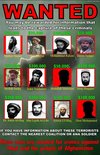|
|
|
Darim Sedgai. |
Darim Sedgai, a “powerful Haqqani Network commander,” was killed inside Pakistan on Jan. 16, Combined Joint Task Force – 82 confirmed today. Sedgai was listed as one of the 12 most wanted fugitives by the task force last August. Sedgai had a $50,000 reward for information leading to his capture.
Sedgai was “known for facilitating smuggling of IED making materials and suicide IEDs into Afghanistan,” the Combined Joint Task Force – 82 press release stated.
The press release also intimated Sedgai was behind the suicide bombing and ground attack on the Serena Hotel in Kabul on Jan. 14. “Suicide attacks like the attack at the Serena Hotel have become a hallmark of the Haqqani network,” the press release stated. Afghan police identified the Haqqani Network as being behind the Serena Hotel attack after capturing four members of the terror support network.
The details of Sedgai’s death are unclear. He “was ambushed and later reportedly died of his wounds.” But the identity of his killers has yet to be released. Combined Joint Task Force – 82 has been running an information operation to turn the Taliban against the Haqqani Network, particularly the network’s leader Siraj Haqqani. He may have been killed by rival Taliban leaders or a Special Forces hit team, or may be the victim of criminal activity.
Sedgai is the third senior member of the Haqqani Network killed since October. Mullah Signee, Siraj Haqqani’s deputy, was killed in an unspecified raid on Dec. 11. Mullah Manan, another senior member of the Haqqani Network, was killed in early November. Manan was killed while infiltrating the Spira district in Khost province, Afghanistan, which borders North Waziristan in Pakistan.
Siraj Haqqani is the son of renowned Taliban leader Jalaluddin Haqqani, a leader of the Taliban in North Waziristan with close ties to Osama bin Laden and the Taliban. Siraj is believed to be running the Haqqani Network and has become a focal point of Coalition operations. Siraj has a $200,000 bounty for his arrest. He has embraced al Qaeda’s tactics and ideology, and has recruited foreign terrorists to act as suicide bombers and operatives inside Afghanistan.
The Haqqani family runs several mosques and madrassa, or religious schools, inside of North Waziristan near Miramshah. The Pakistani government closed down the radical Haqqani-run Manba Ulom madrassa after the US commenced Operation Enduring Freedom in Afghanistan, but the school was reopened in 2004. The Manba Ulom madrassa has been described as a center of jihadi activities, where top Taliban and al Qaeda commanders meet.
The Pakistani government is currently in negotiations with the Taliban in North Waziristan. The 2006 North Waziristan Accord ceded control of the tribal agency to the Taliban. The Taliban and al Qaeda are known to operate 29 training camps in North and neighboring South Waziristan, and use the tribal areas to conduct attacks against US and Afghan forces.










1 Comment
Bill good article, and I well pleased that another evil man has died.
Over at Afghanistanica.com there’s an article on the start of this campaign here:
http://afghanistanica.com/2007/10/02/cash-reward-for-taliban-and-friends/
Note that I don’t think these are all of the “most” wanted. To my mind they are the most active mid-level leaders and cells in the Afghan Taliban. It’s more to get the most visible creeps taken care of, a broken glass campaign.